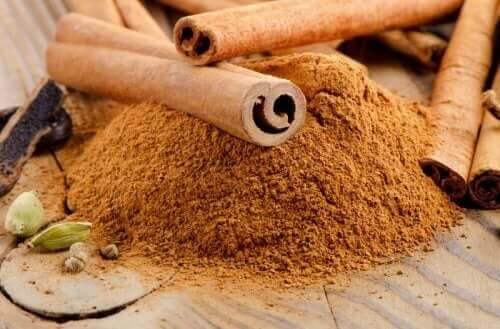Four Medicinal Plants to Soothe Indigestion Naturally

You’ve probably tried to soothe indigestion naturally before. It may be because you probably overate, because some food made you sick, or because you have a weakened digestive system.
In this article, we’ll share the best medicinal plants to soothe indigestion naturally, as well as some simple and effective tips. This way, you’ll be able to relieve digestive discomfort with plant infusions or extracts.
How to soothe indigestion naturally
1. Ginger
First of all, ginger is a medicinal food that you should consume daily thanks to its many healthy properties. Although it’s a great diuretic and cleanser, we’re going to focus on its ability to soothe indigestion.
Consuming ginger, both fresh or dry, is effective in reducing discomfort such as flatulence, abdominal pain, nausea, and diarrhea, as well as being a great option in case of a gastric ulcer. You can take it as a tea or juice, or even add it to foods to improve digestion and enhance the flavor of recipes.
2. Green tea

Its catechin content has numerous properties, including relieving discomfort caused by gas.
This is an ancient medicinal plant that’s very popular around the world today. Green tea is an antioxidant and anti-inflammatory drink, thanks to its catechin content.
Green tea is a medicinal plant that promotes good digestion since it fights gases and relieves that heavy feeling after eating. Moreover, its regular consumption also helps prevent tooth decay and reduces blood sugar and cholesterol levels.
However, you also have to consider that green tea contains caffeine, meaning its a stimulating infusion. Also, it can prevent the absorption of iron, which is why it’s advisable to not take it with meals.
Read more here: How to Fight Indigestion and Bloating
3. Mint
Mint is a common infusion to soothe indigestion. In fact, many people consume it after meals, often combined with pennyroyal. Studies show that it can relax the gastrointestinal tract.
You can find this plant, which is also consumed in infusions, in essential oils as topical and oral remedies. However, it’s very irritating in its pure state, which is why it should always be applied with caution, diluted properly, and at the recommended dose.
Furthermore, it may not be beneficial for people with gastroesophageal reflux.
4. Cinnamon

Simply add some cinnamon to your preparations to enjoy its benefits every day.
Finally, cinnamon is another medicinal plant used since ancient times as a remedy for many ailments. Among them, it helps reduce inflammation, fights free radicals, reduces blood sugar levels, and stimulates the body naturally.
Regarding the digestive tract, cinnamon may help soothe indigestion and the discomfort that gastric ulcers cause. It also promotes liver function and prevents intestinal parasites or the very common Helicobacter pylori.
On a medicinal and digestive level, we recommend opting for Ceylon cinnamon. You can consume it as an infusion or extract or add it to your daily recipes. It’s very common in all types of sweets and desserts and is also an excellent spice for stews, meats, sauces, and stir-fries, etc.
This article may interest you: How to Treat Stomach Indigestion with 5 Homemade Remedies
Tips to soothe indigestion
Finally, in addition to taking these medicinal plants to soothe indigestion, you can also follow these tips if you suffer from digestive discomfort often:
- Chew your food thoroughly and try to eat in a relaxed and unhurried way.
- Don’t combine many different foods in one meal.
- Don’t eat dessert at lunch and leave sweet foods for breakfast or snacks.
- If your symptoms persist and are becoming more intense, see a doctor to rule out possible food intolerances.
Now you know some medicinal plants that can aid digestion and prevent some common ailments naturally. Also, these final tips can be very useful, especially if you frequently suffer from heartburn, bloating, gas, or stomach pain.
All cited sources were thoroughly reviewed by our team to ensure their quality, reliability, currency, and validity. The bibliography of this article was considered reliable and of academic or scientific accuracy.
- Koo, M. W. L., & Cho, C. H. (2004). Pharmacological effects of green tea on the gastrointestinal system. European Journal of Pharmacology. https://doi.org/10.1016/j.ejphar.2004.07.023
- McKay, D. L., & Blumberg, J. B. (2006). A review of the bioactivity and potential health benefits of peppermint tea (Mentha piperita L.). Phytotherapy Research. https://doi.org/10.1002/ptr.1936
- Kundu, S., Ghosh, R., Choudhary, P., & Prakash, A. (2014). Health benefits of various Indian culinary herbs and comparative statistical analysis for organoleptic properties of Indian teas by using analysis of variance (ANOVA). International Journal of Pharmacy and Pharmaceutical Sciences.
This text is provided for informational purposes only and does not replace consultation with a professional. If in doubt, consult your specialist.








